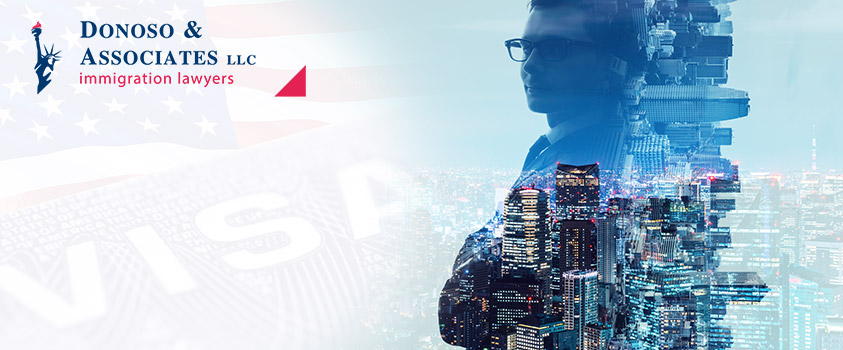Washington, D.C. – September 4, 2019: U.S. Citizenship and Immigration Services (USCIS) adopted new regulations on January 31, 2019 that changed the skilled worker visa program known as the H-1B temporary work visa program (“New H-1B Rules”).
Here are answers to the top 5 questions we are receiving from employers and employees regarding the New H-1B Rules:
1. Why is there an Annual H-1B Lottery?
USCIS holds an annual lottery to allocate 85,000 new H-1B visas each federal fiscal year. Of the total available, 20,000 H-1B visa are reserved for beneficiaries who have completed a U.S. Master’s or Ph.D. degree from an accredited U.S. college or university. The lottery is necessary because demand for new H-1B visas – which usually hovers around 200,000 new applications – far outstrips the 85,000 new visas available annually. The annual H-1B lottery is held by USCIS starting on the first week of April of each year.
2. Do the New H-1B Rules Impact Which Candidates Are Selected?
Yes. The New H-1B Rules inverse the order of the annual H-1B lottery to favor beneficiaries with a U.S. Master’s degree or US Ph.D. degree. The new rules allow USCIS to first run the lottery for 65,000 visas including all advanced-degree beneficiaries. Then, USCIS will run the lottery for 20,000 H-1B visas for any beneficiaries with a U.S. Master’s degrees or U.S. Ph.D. degrees that were not selected in the first run of the lottery. The impact of this change increases the odds of selection in favor of beneficiaries with a U.S. Master’s degree or U.S. Ph.D. degree.
3. Will the New H-1B Rules Require Employer Pre-Registration?
It is likely, but not confirmed. USCIS suspended this part of the New H-1B Rules for the 2019 H-1B lottery. USCIS has not confirmed that the new employer pre-registration system will apply for the April 2020 H-1B lottery. USCIS, however, published new filing fees for employer registrations on September 4, 2019. This appears to be a clear indication that USCIS intends to use the new employer pre-registration system in 2020.
4. How Does the Employer Pre-Registration System Work?
The New H-1B Rules dramatically change the system.
Presently, all employers seeking new H-1B visas under the annual cap file a complete H-1B visa petition (including fees, signed forms, certified labor condition application and all supporting evidence).
Employers would submit short online registrations to participate in the annual H-1B lottery. USCIS would conduct the lottery solely based the online employer registrations instead of requiring a complete H-1B visa petition. Only those registered employers selected in the lottery would need to prepare and submit complete H-1B petitions to USCIS.
Pre-Registration. Employers registration would occur through an online system (that USCIS has not yet launched). USCIS will create a 2-week period prior to April 1, 2019 during which employers must register using the new online platform to file a new cap-subject H-1B visa petition. USCIS would give the public 30-days prior notice of the start-date of the employer registration period. USCIS would run the annual lottery for new cap-subject H-1B visas at the end of the registration period based on employer registrations rather than upon filed H-1B petitions.
Employers whose registration is selected in H-1B lottery would subsequently have to complete the Labor Condition Application before the US Department of Labor, and file the H-1B visa petition with USCIS. The Proposed H-1B Rules do not require a fee for the employer registration. All registrations must state a start-date of employment on the first business day on or after October 1, 2019.
One Registration Per Beneficiary. USCIS requires employers to register and file only one new H-1B visa registration for one new beneficiary. The prohibition extends to related companies of the same group, such as parent companies, subsidiaries or affiliated companies. This prohibits flooding the system with repeat registrations by the same employer for the same beneficiary. Any violation of this rule will authorize USCIS to cancel all registrations by the employer for that particular beneficiary. USCIS would provide employers with a unique identification number for their registration. USCIS intends to prohibit amendment of a registration once it is filed.
Selected Employers Have 60 Days to File the H-1B Petition. Employers selected in the lottery will have at least 60 days to file the certified Labor Condition Application and Form I-129H and supporting evidence with USCIS. USCIS proposes to create several filing windows of 60 days over the course of the fiscal year. Early-filed or late-filed H-1B petitions will be rejected.
Direct Hires. USCIS proposes to only accept an actual H-1B petition for the beneficiary named in the registration. No substitution of beneficiaries will be allowed.
5. What Should Employers Do to Prepare for the New H-1B Rules?
Employers should closely follow developments regarding procedures and deadlines regarding the April 1, 2010 H-1B lottery. The New H-1B Rules create deadlines that will certainly prevent some employers from filing petitions simply because they missed a cut-off date. Additionally, employers will need to be ready for potential problems regarding Labor Condition Applications and gathering supporting evidence. With only 60 days to file the actual H-1B petition, employers selected in the H-1B lottery will be under intense time-pressure to get the application successfully filed with USCIS.
Donoso & Associates, a leading immigration law firm based in Washington, D.C., will continue to report on developments regarding the immigration law and policy through our news section of donosolaw.com.
SCHEDULE A CONSULTATION TODAY.
I.A. Donoso & Associates provide assistance with review and advice regarding eligibility for visas to the U.S. or Canada.
